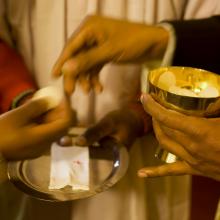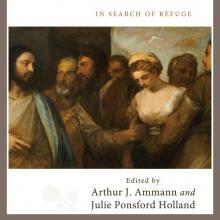Church
Fifty years after the Rev. Martin Luther King Jr. challenged white church leaders to confront racism, an ecumenical network has responded to his “Letter from Birmingham Jail.”
“We proclaim that, while our context today is different, the call is the same as in 1963 — for followers of Christ to stand together, to work together, and to struggle together for justice,” declared Christian Churches Together in the USA in a 20-page document.
The statement, which is linked to an April 14-15 ecumenical gathering in Birmingham, Ala., includes confessions from church bodies about their silence and slow pace in addressing racial injustice.
“The church must lead rather than follow in the march toward justice,” it says.
As has happened many times after I have given a talk about the Body of Christ’s responsibility to care for their brothers and sisters experiencing impoverished and dehumanizing conditions, I was asked to answerthose questions — the ones in my experience that are always the first to be asked the moment I stop speaking.
“How will I know I have given enough? How does the church balance financial responsibility with service to the poor? Where do we draw the line?”
These questions always come, sometimes spoken in a curious tone by a person whose heart is being convicted, sometimes in an angry accusing tone insinuating I must hate prosperity, sometimes privately as a whisper in my ear or in a personal email filled with insinuations about my sanity. What a preposterous proposal, that the Body of Christ in any particular location should be the first resource to its own community for spiritual, physical, and emotional well being! Don’t I know that such a mission is naïve and impossible to achieve? Most recently it was phrased like this: “I love this idea, but it is difficult to see benevolence funds go towards someone's electric bill when they smell like they smoked five packs of cigs before meeting with us; what do we do?”
Church is being reinvented. So are technology and education. And all for the same reasons.
Facebook just started moving Google’s cheese with its launch of Home. An army of upstarts in Silicon Valley is challenging the hegemony of Microsoft. Nothing is staying the same; disruption is the path to prosperity.
The reason: the marketplace is highly dynamic. New needs emerge. New products stimulate new needs. New entrants want to make a difference right away. Problems and opportunities multiply faster than bureaucratic pillars can respond.
ANYONE WHO LIVES in Christian community or participates in congregational life knows that it is a holy mess. A group of flawed individuals trying to do "life together" can bring out the worst in one another. But that's precisely where God calls us to be.
In our hyperindividualistic culture, it's often difficult to remember that God has created us to be in community. Christian faith and discipleship, from the beginning, have been shaped not by going at it alone but by engaging in ancient and contemporary communal experiences. The first house churches and the formation of communities among the early desert fathers and mothers, as well as today's megachurches, parachurch organizations, and new monastic groups, all point to how we long to be connected to God and with one another.
Our faith and character are refined by the miraculous gifts of grace, reconciliation, and forgiveness made available to us in community. In such a demanding and disconnected world, it is indeed a miracle when two or more gather to break bread and give of themselves in service to God and one another.
Here are some books to help us along the Way, as we seek to deepen our understanding of what it means to be in communion with Christ and with each other.
In 2009 I was co-leading a new intentional community in Washington, D.C. Our nascent group endured many struggles, including interpersonal issues, conflicting visions and goals, and the involuntary removal of a community member. How I wish The Intentional Christian Community Handbook: For Idealists, Hypocrites, and Wannabe Disciples of Jesus (Paraclete Press), by David Janzen, was available when we first began our journey.
Pope Francis on Wednesday said women play a “fundamental role” in the Catholic Church as those who are mostly responsible for passing on the faith from one generation to the next.
While the new pope stopped far short of calling for women’s ordination or giving women more decision-making power in the church, his remarks nonetheless signaled an openness to women that’s not often seen in the church hierarchy.
“In the church and in the journey of faith, women have had and still have a special role in opening doors to the Lord,” the Argentine pontiff said during his weekly audience in St. Peter’s Square.
WE WERE LOOKING at cathedrals while others were mourning and burying their dead.
It was the first day of the international design competition that would help choose a few architectural plans that might be used to rebuild Notre Dame de l'Assomption, Our Lady of the Assumption, Port-au-Prince's most famous cathedral. This cathedral was so central to the city that, before it was leveled in the Jan. 12, 2010, earthquake, its turrets could be seen from most places in Port-au-Prince, as well as from the sea, where mariners used a light on the cupola of the church's north tower to help bring their ships home.
During the 2010 earthquake, the Catholic archbishop of Port-au-Prince, Monsignor Joseph Serge Miot, was killed inside an administrative building adjoining the cathedral, along with priests and parishioners. It was the images of their crushed bodies and their loved ones wailing around the perimeters of the cathedral's rubble that motivated me, a non-architect and non-Catholic—but a lover of cathedrals—to agree to join a development strategist, a preservationist architect, a structural engineer, a priest and liturgical consultant, the dean and associate dean of two architectural schools, and the editor of a magazine that discusses the dual issues of faith and architecture to help select three out of the 134 moving, elegant, and in some cases totally out-there designs that we had received from architects all over the world. Among the panelists, three of us were Haitian born, and many of the others had either worked in Haiti or in the Catholic Church for years.
The selection exercise itself was one that mirrored faith, blind faith. We were looking at sketches and plans but had no idea who had designed them. Some of the entries contained written statements that were so moving in their optimism for Port-au-Prince and its 3 million inhabitants, their hopes for Haiti and her people, and their longing for the rebuilt cathedral to serve as a symbol of renewal that they nearly brought me to tears.
THE CHURCH IS locked in a polarized debate around same-sex relationships that is creating painful divisions, subverting the church's missional intent, and damaging the credibility of its witness. We've all heard the sound-bite arguments. For some, condoning or blessing same-sex relationships betrays the clear teaching of the Bible, and represents a capitulation to the self-gratifying, permissive sexual ethic of a secularized culture. For others, affirming same-sex relationships flows from the command to love our neighbor, embodies the love of Jesus, and honors the spiritual integrity and experience of gay and lesbian brothers and sisters.
The way the debate presently is framed makes productive dialogue difficult. People talk past one another. Biblical texts collide with the testimony of human experience. The stakes of the debate become elevated from a difference around ethical discernment to the preservation of the gospel's integrity—for both sides. Lines get drawn in the ecclesiastical sand. Some decide that to be "pure" they must separate themselves spiritually from others and break the fellowship of Christ's body. Then the debate devolves into public wrangling over judicial proceedings, constitutional interpretations, and property ownership. Meanwhile, the "nones," those who are walking away from any active relig-ious faith, find further confirmation for their growing estrangement.
Mirroring the dynamics of contemporary secular politics, the debate is driven by small but vocal minorities with uncompromising positions at one end or another of the spectrum. For the majority in the middle, who may be unclear about their own understandings, exploring their questions is made difficult because of the polarized toxicity of the debate. Further, those in positions of leadership in congregations or denominations come to regard the controversy over same-sex relationships as the "third rail" of church politics. They don't want to touch it. I know this because I've been there myself.
The first Christmas after my daughter was born, I got a two-year membership to 24 Hour Fitness as a gift. Included in the membership was one personal training session.
My trainer bristled with annoyance at my “fad diet” when I told him we were going Paleo for three months. Then he showed me to the elliptical machine and told me that he lost weight by drinking sugar-free Kool-Aid all day and ordering off of the light menu at Taco Bell.
Obviously, our philosophies weren’t in line. But I was still able to get some cardio, weights, and an occasional spin class in at the gym. No hard feelings. But staying motivated and committed to working out while staying home with a toddler has been hard.
That might be because I haven’t tried CrossFit.
I think CrossFit is like secular church. It offers more than weight loss or fitness. It speaks to our innate desires for community, purpose, and transformation.
CLARKSVILLE, Tenn. — We did a focus group here as part of strategic planning at Trinity Episcopal Church.
Question: if you stood on the edge of your church’s property and looked outward, rather than inward as we usually do, what would you see?
A public school kindergarten teacher spoke about kids who come to school hungry and wearing shabby clothing. She started to discuss the family chaos her kids describe during sharing time, but she began to weep and couldn’t speak at all.
Life inside a bubble can feel complete, even dynamic, as the bubble’s surface shimmers and yet retains form.
When the surface is breached, the bubble collapses immediately, shattering into a liquid spray faster than a metal object can fall through where it used to be. What looked like a permanent structure is, in fact, uncertain and quickly lost.
We saw a ”tech bubble” burst 13 years ago. What had seemed durable and laden with value turned out to be vapor. The “housing bubble” came next. Some think another “tech bubble” is about to burst.
The bubble I see bursting is establishment Christianity in America. It is bursting ever so slowly, even as millions of people still find life, meaning, safety, and structure inside. But one failing congregation at a time, the surface of shimmering shape is being breached.
Bio: Executive director of Sexual Minorities Uganda, which works for full legal and social equality in the country, and recipient of the 2011 Robert F. Kennedy Human Rights Award. www.sexualminoritiesuganda.net
1. What’s your response to the letter U.S. religious leaders signed last year, which condemned the “Anti-Homosexuality Bill” before Uganda’s Parliament because it “would forcefully push lesbian, gay, bisexual, and transgender (LGBT) people further into the margins”?
Uganda is a very Christian country. About 85 percent of our population is Christian—Anglican, Catholic, and Pentecostal. So for religious leaders to speak out against the Ugandan legislation, that is very important for me and for my colleagues in Uganda, because it speaks not only to the politicians and legislators, but also to the minds of the ordinary citizens.
It is very important to have respected religious leaders involved, including Archbishop Desmond Tutu, because these are leaders who have spoken out on other human rights issues such as apartheid, women’s rights, and slavery. And for us, for the voice of LGBT rights, to join with these other issues clearly indicates that our movement is fighting for human rights.
OVER DINNER my friends and I reflected recently on the headlines that surprised us last year. A few were especially painful: former Rep. Todd Akin's comment that "legitimate" rapes do not lead to pregnancies; failed Senate candidate Richard Mourdock's comment that a pregnancy from rape is "something that God intended to happen"; and the Violence Against Women Act (VAWA), in effect since 1994, ending as the 112th Congress closed without reauthorizing it. All reminded me why the second edition of The Cry of Tamar: Violence Against Women and the Church's Response, by Pamela Cooper-White, is still needed almost 20 years since its first edition.
The Cry of Tamar reads as a graduate textbook on providing pastoral support for the victims of violence against women. It weaves pastoral counseling methods and social and psychological theories in dialogue with biblical exegesis and constructive theology to give clergy, pastoral caregivers, and religious leaders tools to help victims of violence and the larger Christ-community.
The story of Tamar, a girl raped 3,000 years ago in Jerusalem, frames and guides the book's goal of providing healing to the girls and women who are victims of violence today.
Advocacy, prevention, and intervention to stop violence against women have advanced since the 1995 first edition. Religious communities and congregations have become more informed about how to care and respond to both victims and perpetrators. But the need for increased awareness and education is ongoing. This second edition is an effort to update the conversation and keep it on the table.
As the flu outbreak spreads across 48 states, some religious leaders are advising their flocks to take precautions, but others say avoiding infection is just a matter of common sense.
Several Catholic dioceses, including Manchester, N.H., Boston, and New York, are advising priests to consider not offering the shared chalice of consecrated wine at Holy Communion at Masses. Communicants would only receive the consecrated wafer.
In addition, Manchester Bishop Peter Libasci had other suggestions, reported The Eagle Tribune of North Andover, Mass.
“The faithful should be encouraged to share the Sign of Peace without touching hands or kissing,” he said. “This may be done with smiles and a bow of the head in reverence to one another.”
It’s easier to guide the vision and mission of a church you start. It’s another thing to help a 135-year-old congregation reimagine what it means to be a downtown urban church in a world that has changed dramatically all around it. At Milagro, the church we founded in our living room some nine years ago, we set the course for what we wanted that community to look like: a refuge for the spiritual walking wounded, safe haven for questions, doubt, and a culture of mutual encouragement, support, and accountability that would allow people to explore their own relationship with the Divine. We have since set that community free and already, it is becoming something different.
As well it should.
Now we find ourselves at First Christian Church in downtown Portland — a different animal entirely. In some ways, the two communities are very complementary, in that one has what the other tends to lack. But we’ve discerned that, first and foremost, our job is to help cultivate a spirit of radical openness and welcome. But what does this mean, and how do we even begin to change the makeup of an institution that has exited for more than five generations before us?
Sometimes, it’s the simplest things that say the most. We had a tradition at Milagro of “mugging” people when they came for the first time. This meant one of our hospitality stewards (AKA, “muggers”) would approach them and give them a coffee mug filled with candy and some information about the church. With First Christian, however, most people know we’re here; the bigger question lingering in the public mind is why.
In this case, instead of a brochure describing programs or institutional history, Amy included the welcome statement that follows, which she borrowed and adapted from a Catholic community.
LAST FALL, I (Anne Marie) decided to take a break from the church I had been attending to check out a nearby Episcopal service with one of my housemates, Joshua. I had no idea at the time that this might turn into a permanent switch. My Baptist, Anabaptist, and evangelical roots don’t quite explain what drew me to St. Stephen’s Church that Sunday, but I remember the thought that kept going through my head: I need to take Communion.
For a number of reasons, I had been feeling apathetic toward Christian faith. I needed something official and visceral to cleanse me of the growing indifference I felt. The thought entered my mind: I need some bread and wine, because if my own prayers can’t kindle the spirit of Jesus within me, then I’ll get him in there by force. I hoped that partaking in the real-deal-flesh-and-blood would allow me to return to my own church in peace.
I can’t say that the Episcopal service that day cured me of all my doubts and frustrations about Christianity, but I did find meaning in the liturgy, rituals, and traditions that continued to sustain me in my first year in a new city. As Joshua and I continued to attend St. Stephen’s, we each reflected on what we, as young adults, are looking for in church and Christian community.
Church advertisements often focus on how to keep young people “engaged,” and there are countless new books about why young people are leaving the church. Statistics show decreased church attendance among those in our generation, and while this may be cause for concern, I’m not too worried about it. I’m glad that churches and denominations are interested in engaging young people, but so often this well-meaning desire is rooted in fear and anxiety about the future of the church. Is Christianity becoming obsolete? Will the church die away?
News flash: Christianity isn’t going anywhere. But churches and denominations may have to adapt—and not necessarily the way they’re doing so now—if they are to survive.
As 20-somethings who’ve left the cocoons of family and college for our first forays into the “real world,” we have two basic conclusions about what we are looking for in church communities.
The estranged son of a Kansas pastor famous for protesting the funerals of soldiers and AIDS victims has condemned his family’s plans to picket the funerals of the 26 people — including 20 children — who were killed when a gunman stormed a Connecticut elementary school.
In the wake of Friday’s massacre in Newtown, Conn., members of Westboro Baptist Church in Topeka, Kan., posted Twitter messages saying they would picket outside Sandy Hook Elementary School in Newtown. The messages provided no information on the time of the planned picketing.
"Westboro 'God hates Fags' Baptist Church is planning to picket at Sandy Hook, to praise 'God's judgment,'” was posted by Margie Phelps, the daughter of Westboro leader Fred Phelps Sr. Her sister, Shirley Phelps-Roper, tweeted Saturday that the group would "sing praise to God for the glory of his work in executing his judgment."
When it comes to sharing the Eucharist among faithful but separated Christ followers, I wonder if Jesus is waiting for the churches simply to be the Church?
For the sake of this uncommon meal and the One who gives himself to us in it we can partake together, not on the shaky foundation of our present tragic divisions but on the firm ground of our promised unity by joining now in the Great Feast we will celebrate with him forever in eternity.
It is, after all, his table. It is a table set not only in the presence of our enemies in this world but set also in the unseen realm of Christ’s anticipated future rule that in a mystery comes to each of our houses of worship simultaneously as we gather in hope to encounter his resurrected person, week in and week out.
In this scenario, we remain mindful and respectful of our present divisions yet act on the coming unity we know is ours now by promise because no prayer of Jesus, certainly not his prayer that we be "one," can ever fail (John 17).
I’ll preface this piece my saying I know I am making some broad generalizations based on gender, and that there are always exceptions to every trend. But despite that, I do think there are some cultural trends that can offer us some useful insight.
Anyone who has been paying attention has noticed that, of those left within the walls of most churches, the majority still hanging in there are women. Some, like the advocates of so-called Masculine Christianity, see this as a crisis. The Christian faith and its symbols are becoming softened, feminized, compromised into being something other than what they were meant to be.
Granted, when you take a faith whose principal authors historically have been men and then place that same faith in the hands of women, some things will inevitably change. Personally, I welcome the exploration of other, feminine expressions of the divine and values such as embodied spirituality that many female Christian leaders value. But aside from these assets, I think that women bring something far more critical to institutional religion.
Without them, it may cease to exist.
EXCLUDING WOMEN from leadership weakens the commitment and contributions of churches, theological institutions, and the global church in their participation in God's prophetic mission. It translates to women's priorities and specific needs being inadequately articulated and under-resourced.
For instance, matters of sexuality, reproductive health education, and justice are hardly ever discussed in churches or theological institutions, except when governments want to legalize abortion. Similarly, little attention is given to maternal health care despite the high rates of maternal death and infant mortality in Africa. It is not enough for churches to focus on baptizing children, blessing them, and welcoming them into the house of God when they neglect to care for their well-being from the time they are in their mothers' wombs, especially now that so many children are born HIV-infected. Responsible and healthy sexuality, childbearing, and parenting are matters that require full engagement of both women and men, and the churches should be at the forefront of providing much-needed education.
Women have been left to shoulder the burden of the times: preventing HIV transmission, facing HIV-related stigma, handling deaths, and addressing the myriad other adverse impacts that the HIV pandemic has created. Similarly, in the Circle of Concerned African Women Theologians, of which this author is a founding member, women have provided leadership in naming theological, ethical, cultural, and religious beliefs, as well as harmful practices and leadership styles, that fuel gender disparity, social injustices, and the spread of HIV in religious communities and in society at large. The Circle also has endeavored to provide theological and ethical reflections that are empowering and transformative to the behaviors contrary to God's will for how women and men relate to each other in families, religious contexts, and everyday life.
WANT TO PUT money to work for the common good? Your congregation—large or small—has more to invest than you might expect. Here are three questions to get you started.
1. Where does our church bank? "Many churches choose a bank based on proximity to the church or the church treasurer's home," Andy Loving says, but it doesn't have to end there. Approach the finance committee and say, "We want to put our money somewhere that has implications for what we value as a church," suggests Loving. Find a bank that empowers economically depressed areas through brick-and-mortar locations and socially responsible loan practices.
2. Does the bank we're considering provide options for the poor? Where are the branches located? Does it loan to people or businesses who typically don't get approved by mainstream lenders? One institution Loving recommends is Self-Help Credit Union in Durham, N.C., which has locations throughout the state—and also a web-based interface convenient for members outside the area. Another place to hunt for justice-oriented banking is the National Community Investment Fund website, www.ncif.org, which allows you to search by location and banking practices.













